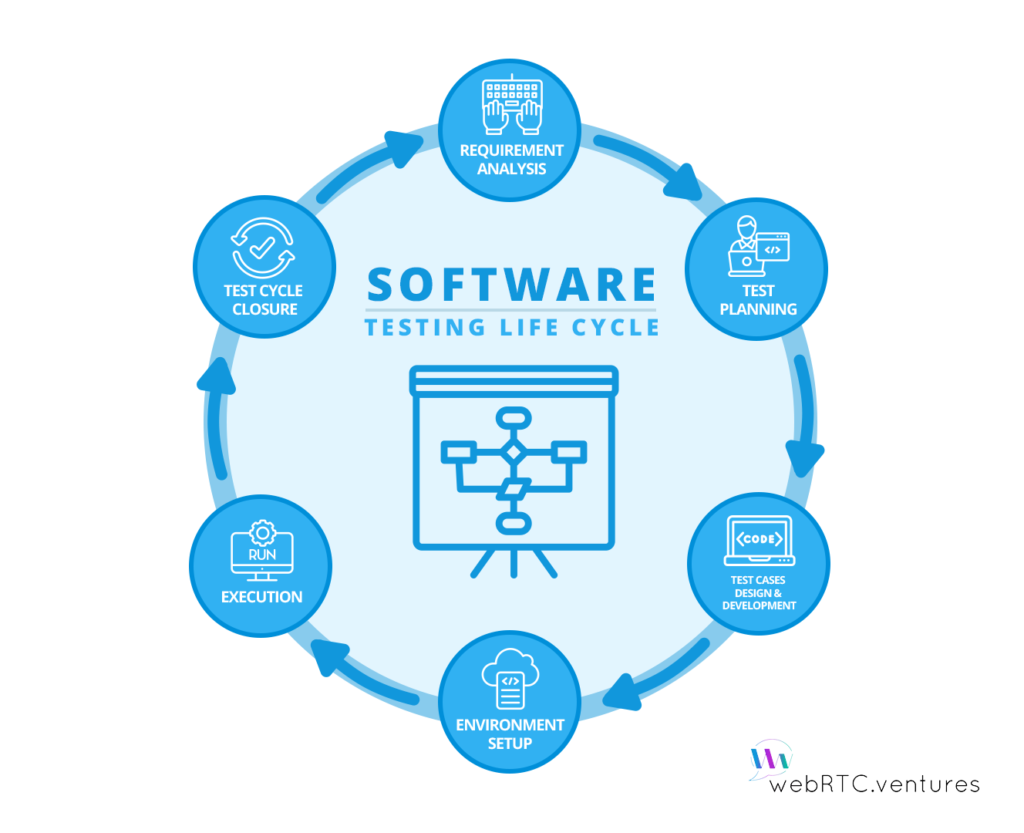Presenting a flawless live video application or integration to our clients is the ultimate goal of our work here at WebRTC.ventures. Testing is an integral part of that software development life cycle. The experience of our dedicated QA testing team located in our Panama City, Panama office allows us to implement efficient and expert testing for both full-scale development and standalone-testing clients.
As I mentioned in my previous blog post, software testing has become more important than ever. It has also evolved greatly over the past decades. Today, testing is not just about reporting bugs to the developer. It has a much broader scope and adds great value, especially when implemented from the beginning of the project. Software testing, too, has its own life cycle.
Phases of the software testing life cycle

Validating is an essential part of the process to ensure precision and accuracy. Performing software testing is not an easy task and is carried out by our testing team in a sequential series of phases. Each phase of the STLC has a specific objective and deliverables. Let’s talk about each of them.
1. Requirement analysis
The requirements analysis starts each journey off on the right foot. We work closely with the client to understand the full nature of the project and then to define the scope of testing, making sure there is alignment between our recommendations and the client’s expectations/goals.
2. Test Planning
The most important aspect of planning tests is to understand how to judge the application’s success. We combine your success criteria with our best practices in building video apps to come up with an efficient test plan that focuses on delivering the highest value testing.
During the planning phase we will choose the project framework and the appropriate schedule and tools to manage the tasks and day to day activities across the project. We like to use Slack, a simple communication tool with easy integration between different work teams. Other tools we use are discord and google chat.
3. Test cases design & development
This is a complex stage and is a process that must be carried out iteratively. Based on the test plan, our QA team designs and documents test cases. Test cases should be long and cover as many variables as possible. All applicable permutations and combinations must be collected. We prioritize the test cases by investigating which of them are more common or which of them will have a greater impact on the product.
Subsequently, the verification and validation of the requirements specified in the documentation stage is carried out. In addition, the review, update, and approval of automation scripts and test cases are developed throughout this stage.
4. Environment setup
Test activities require certain environmental factors, such as servers, frameworks, hardware, and software, to run developed test cases. Our testing team relies on the knowledge and expertise of our DevOps team, who are in charge of creating the environments with the necessary parameters for the execution of the tests depending on the particular requirements of each project. Our DevOps team also performs testing tasks in a different layer from a more specialized perspective, such as load testing and penetration testing.
In this phase it is also important to ensure that the test team has the necessary tools to report the findings generated during the execution of the tests. Our team in particular relies on tools such as TestLink, Jira and Trello to control and manage our testing process.
5. Execution
The test execution process involves the implementation of the activities outlined in the test planning process. These tests are developed in planned test environments appropriate to the test level. The testing team is also responsible for comparing the expected results with the actual result. This is precisely what we do when we test one of our custom interactive broadcasting applications.
When a system failure is detected, it must be documented and sent to the development team to fix the defect. Once it has been corrected, we carry out a re-test to confirm that the defect was successfully solved. Finally, we run a regression test cycle to guarantee that the debugging process has not triggered other defects in the system. It is during this phase where, as test experts, we ensure that the development complies with usability and requirements from our clients.
6. Test cycle closure
Last, but not least, the closure phase consists of finalizing and archiving test cases and evaluating the testing process. As part of our deliverables, we generate a test evaluation report for the client that shows the traceability throughout the test cycle and the specific activities that were performed by the testing team.
Do you want to see what this testing report looks like by the end of your next project? Let us know your needs and we will be glad to assist you in achieving your goal!

At WebRTC.ventures, we attach great importance to software testing in our development work and for our testing-only clients. Ensuring excellent quality in everything we do is part of what makes us unique as testing experts. If you are interested in knowing more about what our testing services can offer to your business, contact us today!











